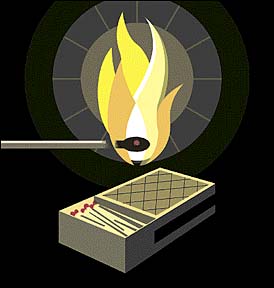Spanish
Dancer
(New Poems, by Rainer Maria Rilke,
June 1906, Paris)
As on all its sides a kitchen-match darts white
flickering tongues before it bursts into flame:
with the audience around her, quickened, hot,
her dance begins to flicker in the dark room.
And all at once it is completely fire.
One upward glance and she ignites her hair
and, whirling faster and faster, fans her dress
into passionate flames, till it becomes a furnace
from which, like startled rattlesnakes, the long
naked arms uncoil, aroused and clicking.
And then: as if the fire were too tight
around her body, she takes and flings it out
haughtily, with an imperious gesture,
and watches: it lies raging on the floor,
still blazing up, and the flames refuse to die--.
Till, moving with total confidence and a sweet
exultant smile, she looks up finally
and stamps it out with powerful small feet.
From The Selected Poetry of Rainer Maria
Rilke, translated by Stephen Mitchell
|
Spanische
Tänzerin
(Neue Gedichte, von Rainer Maria Rilke,
Juni
1906,
Paris)
Wie in der Hand ein Schwefelzündholz, weiß,
eh es zur Flamme kommt, nach allen Seiten
zuckende Zungen streckt--: beginnt im Kreis
naher Beschauer hastig, hell und heiß
ihr runder Tanz sich zuckend auszubreiten.
Und plötzlich ist er Flamme, ganz und gat.
Mit einem Blick Entzündet sie ihr Haar
und dreht auf einmal mit gewagter Kunst
ihr ganzes Kleid in diese Feuersbrunst,
aus welcher sich, wie Schlangen die erschrecken,
die nackten Arme wach und klappernd strecken.
Und dann: als würde ihr das Feuer knapp,
nimmt sie es ganz ausamm und wirft es ab
sehr herrisch, mit hochmütiger Gebärde
und schaut: da liegt es rasend auf der Erde
und flammt noch immer und ergiebt sich nicht--.
Doch sieghaft, sicher und mit einem süßen
grüßenden Lächeln hebt sie ihr Gesicht
und stampft es aus mit kleinen festen Füßen.
|
